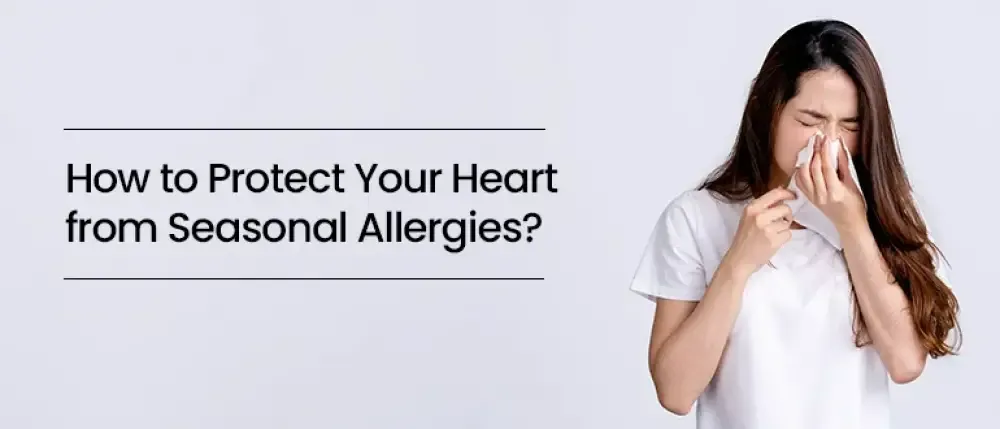Allergies refer to the body’s reaction to foreign substances known as allergens. Individuals prone to seasonal allergies should know that allergic reactions can also impact their heart health. Such people are more at risk of developing heart conditions and hypertension because of the body’s immune reaction to allergens which causes inflammation.
In this blog, we will discuss seasonal allergies, their symptoms along with seasonal allergies treatment and the correlation between seasonal allergies and heart health.
What are Seasonal Allergies?
Seasonal allergies, also known as allergic rhinitis occur due to the over-reactive immune response of our body to certain environmental substances or allergens at specific times of the year. As a result of an allergic reaction, your body’s immune system produces antibodies. These antibodies work to remove allergens present in your skin or respiratory tract by releasing histamines. Histamines cause seasonal allergy symptoms.
Skin, food and respiratory allergies are the most common types of seasonal allergies caused by pollens, dust, mould spores, pollution etc. These allergies may not directly affect your heart but may contribute to the risk factors causing high blood pressure and coronary heart disease.
Can Seasonal Allergies Increase Heart Rate?
Seasonal allergies indirectly affect your heart health. The medication used for the treatment of seasonal allergies has certain side effects including an increased heart rate which harms your cardiovascular system. Hence, it is important to understand the impact of medication on your heart health before starting any treatment. Following are certain medications used to treat allergies, which have an impact on your heart:
Decongestants
Decongestants are commonly used to provide seasonal allergy relief. It reduces congestion by narrowing blood vessels in your nose. Generally, decongestants are safe to use but as these are stimulants they can cause increased heart rate and high blood pressure. Hence, consult with your doctor whether it is safe for you to take decongestants or if you are at a risk of developing heart issues.
Nasal Sprays
Nasal sprays are also commonly used to provide relief from a blocked nose. However, overuse can cause side effects like an increased heart rate. Hence, use nasal sprays only when your doctor prescribes it and take the recommended dosage only to avoid any complications.
What are the Common Symptoms of Seasonal Allergies?
People with allergies can have severe seasonal allergy symptoms to mild symptoms depending on the severity of the allergic reaction. It is quite common for people to develop certain allergies later in life even after never having any allergies during childhood, it happens due to poor lifestyle habits and changes in environmental factors. Symptoms of seasonal allergies in adults are the same as the symptoms in children. Some common symptoms of seasonal allergies are given below:
- Runny nose
- Itchy eyes
- Itchy throat
- Sneezing
- Cough
- Congestion
- Headache
- Rashes
- Hives
What is the Best Treatment for Seasonal Allergies?
To avoid side effects from these medications, there are alternative allergy treatments available as explained below:
Nasal Saline Rinse
It is a safer way to remove any allergens from the nose. It also helps in reducing the congestion. It is done using a neti pot. With the help of the pot, saline water is poured through one nostril which drains out through the other nostril, clearing the blocked nasal passage. If you have never done this before, do it under the supervision of an experienced practitioner only.
Allergy Shots
Another cure for seasonal allergies is allergy shots, which are injections that are given to build immunity against allergens. Allergy shots are safer compared to over-the-counter allergy medications. However, these shots are prescribed only if a person is suffering from severe allergy. In this method, allergens in trace amounts are injected into a person who builds tolerance against these allergens over a period of time. It is a long-term treatment where injections are administered once a week for several months.
Antihistamines
Histamines are chemical substances responsible for allergic symptoms, and oral antihistamine medication helps in relieving allergic symptoms by blocking histamines. It is commonly used for immediate relief from severe allergic reactions. It is safer for your heart and has mild side effects like dry mouth and constipation.
How to Manage Seasonal Allergies?
If you suspect of having developed any seasonal allergies, do not wait for symptoms to appear and consult an allergist. An allergy specialist will be able to diagnose your allergy through tests. A seasonal allergy testing is the best way to identify allergens. Your doctor will start treatment according to the allergens and your medical history. Once you identify the cause of the allergy, you can also take precautions such as wearing a mask outdoors, avoiding certain foods and monitoring your heart health to avoid any side effects.
As it is established that the suggested medicines for treating allergies can lead to heart complication, no matter mild or severe, it is wise to take proper precautions. In case of a medical emergency it is highly recommended to have a solid financial back-up to combat the soaring healthcare expenses. And there is nothing better option than having a health insurance plan in place to manage those unexpected expenses which can burn a hole in your pocket. With Care Health Insurance family health insurance plan, you can ensure quality healthcare to your family. Additionally, you can consider our Heart Mediclaim or Heart Health Insurance for other heart related issues as well. With a fast and hassle-free family health insurance claim process, the insurer has settled 48 Lakh+ claims till date. It has 24800+ healthcare providers where you can avail cashless treatment without having to push from pillar to post arranging for the money in the times of need. Connect with our experts today to make your tomorrow better!
Disclaimer: The above information is for reference purposes only. Kindly consult your general physician for verified medical advice. The health insurance benefits are subject to policy terms and conditions. Refer to your policy documents for more information.

